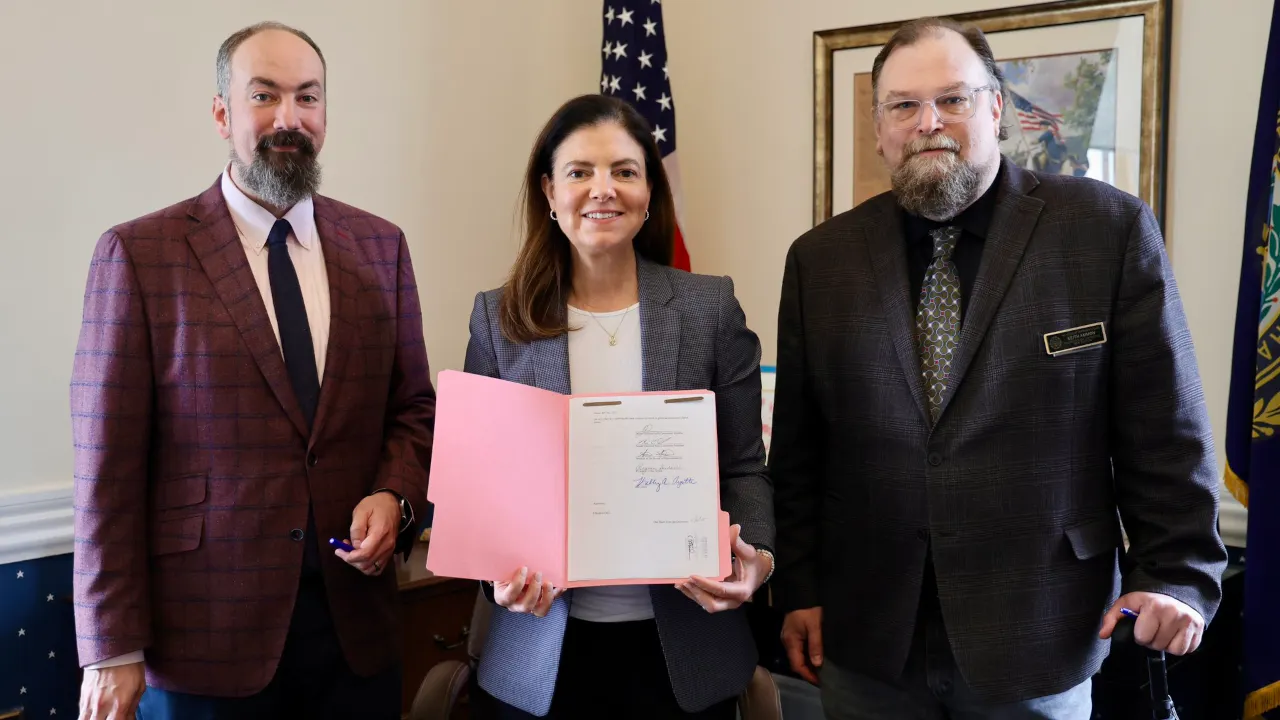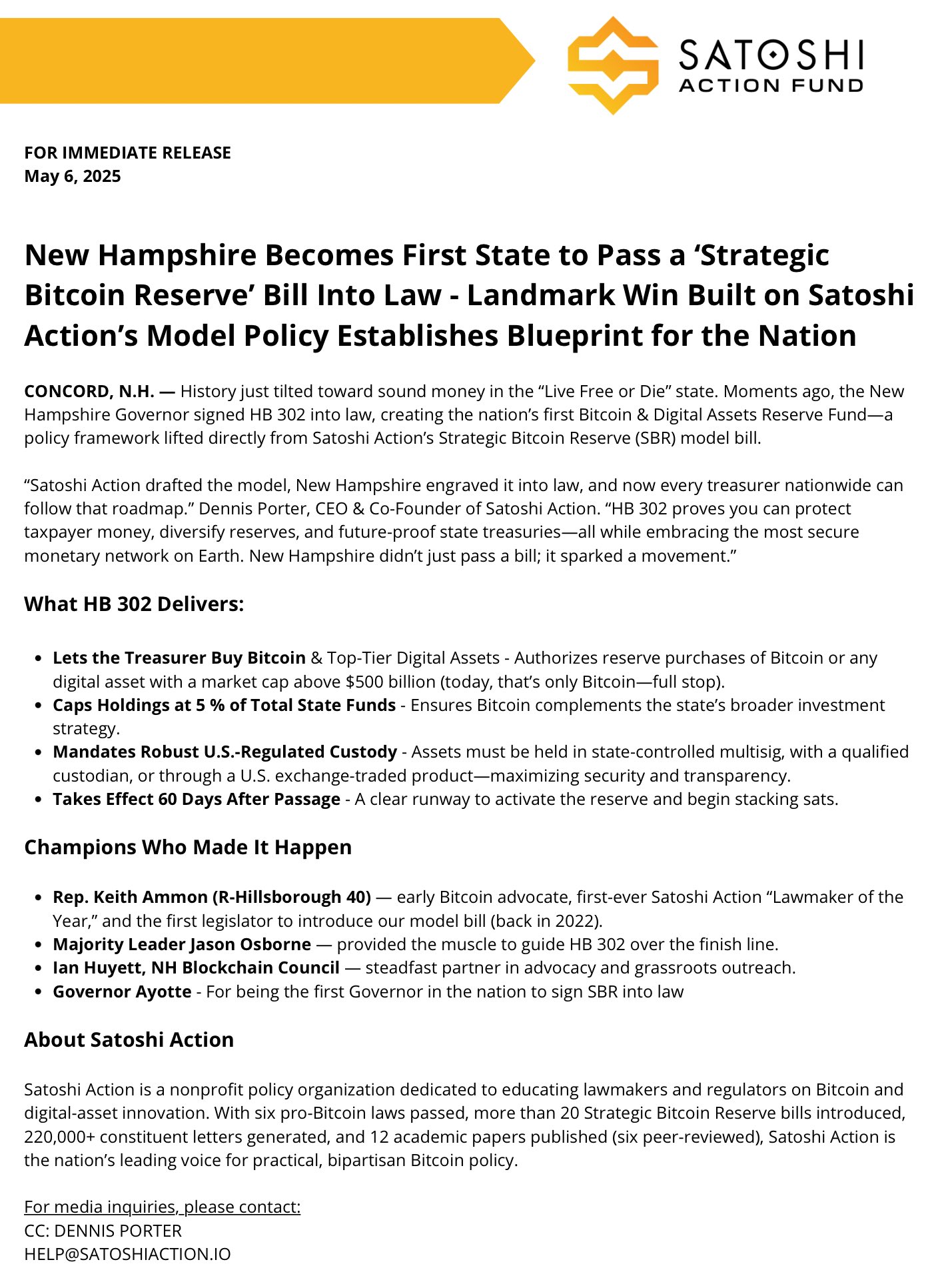
Milestones in American Financial History
On May 7, 2025, New Hampshire made a significant mark in financial history. Governor Kelly Ayotte signed HB302, making the state the first in the U.S. to officially include cryptocurrencies, specifically Bitcoin, in its strategic reserves. This groundbreaking bill, which will take effect in 60 days, allows the state treasury to invest up to 5% of its public funds in digital assets with a market value of more than $500 billion, as well as precious metals such as gold and silver. In the current market, only Bitcoin meets this criterion with a market value of approximately $1.88 trillion, making New Hampshire a pioneer in the mainstreaming of cryptocurrencies.
The significance of this move goes far beyond state borders. It marks a shift in the U.S. government’s attitude toward digital assets from suspicion to strategic acceptance. As the first state to implement such a policy, New Hampshire is not just testing the waters, but boldly embracing a future where Bitcoin could be on par with traditional assets like gold. This article will delve into the details of HB302, its potential economic impact, similar legislative developments in other states, and the broader significance of Bitcoin’s role in global finance.
Deconstructing HB302: A bold financial experiment
HB302 was introduced by Republican Congressman Keith Ammon and passed the state House of Representatives with a narrow margin of 192 votes to 179 with bipartisan support, and passed the Senate Committee by 4 to 1. The bill authorizes the state treasurer to invest up to 5% of public funds (including general funds and revenue stabilization funds) in eligible digital assets and precious metals. The initial proposal suggested an allocation of 10%, but in response to concerns about volatility and security, the final version was lowered to 5%.
The bill explicitly requires investments in assets with a market value of more than $500 billion, making Bitcoin the only cryptocurrency that meets the criteria. In comparison, the second-ranked Ethereum has a market value of only about $214 billion. This targeting highlights Bitcoin as the only digital asset with scale and stability suitable for state-level investment. The bill also provides for a safe custody method, allowing assets to be held through state-controlled multi-signature wallets, qualified custodians, or exchange-traded products to ensure robust security measures.

Potential purchasing power
New Hampshire's total budget for fiscal year 2025 is about $15.4 billion, and its general fund is about $5.6 billion. Based on the 5% cap, the state can use between $280 million and $770 million of its funds for Bitcoin and precious metal investments. State Treasurer Monica Mezzapelle said initial investments could start as a pilot with a scale of about $180 million to test market reactions and then gradually expand.
To put this into context, if New Hampshire invested $280 million at $95,000 per Bitcoin (a reasonable estimate based on recent market trends), it would purchase approximately 2,947 Bitcoins. If it invested $770 million, it would purchase approximately 8,105 Bitcoins, equivalent to 0.04% of the total 19.7 million Bitcoins in circulation. While not large on a global scale, this allocation would make New Hampshire a significant institutional holder, demonstrating its confidence in the long-term value of Bitcoin.
The passage of the bill comes as Bitcoin’s price has surged past $100,000, helped in part by the federal government’s March 2025 executive order signed by President Trump to create a national Bitcoin reserve using 200,000 confiscated Bitcoins. New Hampshire’s move further amplifies this momentum and could drive prices even higher as institutional demand grows.
Why New Hampshire? The Granite State's Unique Position
It is no accident that New Hampshire passed HB302. Known for its motto "Live Free or Die," the state has long fostered a culture of independence and innovation. No state sales tax and minimal regulatory burdens make it a haven for businesses and individuals seeking financial freedom. The state has also attracted blockchain enthusiasts and libertarians through initiatives such as the Free State Project, creating a crypto-friendly environment.
HB302 is in line with this spirit, positioning Bitcoin as a tool to fight inflation and protect the purchasing power of state funds. Unlike traditional assets, Bitcoin's decentralized nature and fixed supply cap of 21 million make it an attractive means of storing value, especially in an era of rising federal debt and increased monetary uncertainty. By including precious metals in the bill, lawmakers position Bitcoin alongside gold as a "hard asset" for turbulent times.
Ripple effect: Legislation moves forward in other states
New Hampshire’s groundbreaking move is not an isolated incident. At least 26 states across the country have proposed or are actively considering legislation to establish Bitcoin or digital asset reserves, reflecting the growing recognition of the potential of cryptocurrencies. These efforts, driven by federal encouragement and the mainstreaming of Bitcoin, vary in scope and progress. Here is an overview of several key states and their initiatives, based on available data.
Arizona: Close behind
Arizona has become a popular candidate state to establish a Bitcoin reserve. In April 2025, the state House of Representatives passed two bills, SB1373 and SB1025, which allow the state treasurer to invest up to 10% of public funds in Bitcoin and other digital assets. The bills are awaiting the signature of Governor Katie Hobbs, and if passed, Arizona could become the second state with a formal reserve. With its budget of about $18 billion, a 10% cap could translate into an investment of $1.8 billion, far more than New Hampshire. However, Democratic Governor Hobbs is skeptical and the possibility of a veto remains.
Ohio: A long-term commitment
Ohio's SB57, introduced by Senator Sandra O'Brien in January 2025, takes a bold approach. The bill authorizes direct investment in Bitcoin, requires a minimum holding period of five years, and requires state agencies to accept cryptocurrency payments. It also allows residents and institutions to donate Bitcoin to reserves. The bill, currently under review by the Senate Finance, Insurance, and Technology Committee, has attracted attention for its ambitious scope, but it has also faced obstacles. With Ohio's $86 billion budget, a 10% cap could support $8.6 billion in investments, although initial allocations may be more conservative.
Texas: Embracing decentralization
Texas is a center of crypto innovation. Congressman Giovanni Capriglione proposed the Texas Strategic Bitcoin Reserve Act in December 2024. The bill establishes a dedicated fund for Bitcoin, which will be managed by the state comptroller, require holding for at least five years, and allow public donations. With a budget of more than $150 billion in Texas, a 10% cap can support $15 billion in investment, making it a potential heavyweight player in state-level Bitcoin adoption. The bill is still in its early stages and committee review is ongoing.
Oklahoma and Florida: Gaining momentum
Oklahoma's HB1203, introduced by Representative Cody Maynard, aims to build a Bitcoin reserve to take advantage of its growth potential. Florida is advancing legislation to allow the state treasurer to invest in Bitcoin, and a House vote is imminent. The budgets of these two states far exceed those of New Hampshire, and if the bill passes, the potential investment could be between $1 billion and $3 billion.
Rhode Island: Flexible Strategy
Rhode Island's HB6007 authorizes the state treasurer and retirement system to invest in Bitcoin and other digital assets to hedge against inflation. The bill defines digital assets broadly, including stablecoins and NFTs, reflecting a more inclusive strategy. With a budget of approximately $14 billion, Rhode Island could allocate up to $700 million. The bill is under committee review and discussions are continuing.
Frustrated efforts and opposition
Not all states accept Bitcoin reserves. Pennsylvania, Montana, North Dakota, Wyoming, and South Dakota have rejected similar bills, citing volatility, energy consumption, and risks to taxpayer funds. The Wyoming veto was particularly notable because Senator Cynthia Lummis has been an active advocate for Bitcoin at the federal level. These setbacks highlight the challenge of balancing innovation with fiscal prudence.
Potential purchasing power by state
If all 26 states with active or proposed Bitcoin reserve bills adopted a 5-10% allocation, the collective purchasing power would be staggering. Assuming an average state budget of $30 billion, and a conservative 5% cap, the 26 states could collectively invest $39 billion, enough to purchase approximately 410,500 Bitcoins at $95,000 each, or 2% of the Bitcoin supply. At a 10% cap, this figure could double to $78 billion, or 821,000 Bitcoins. This demand could drive prices significantly higher, as Bitcoin is in limited supply.
However, political and economic realities limit this potential. Democratic-led states like California and New York are less likely to pursue such policies, while Republican strongholds like Texas and Florida are more enthusiastic. Actual investment will likely come in phases, and New Hampshire's $180 million pilot program could set a model for other states.
A new era for Bitcoin
New Hampshire's HB302 is a watershed moment, not only for the state, but for the global perception of Bitcoin. By legalizing cryptocurrency as a strategic asset, the Granite State opens the door for other states to follow suit. While the direct financial impact -- $280 million to $770 million in potential investments -- is limited, the symbolic significance is huge. It shows that Bitcoin is no longer a fringe experiment, but a serious competitor in the financial world.
With states like Arizona, Texas, and Ohio moving forward with their own bills, the U.S. could see a wave of institutional Bitcoin adoption, reshaping markets and policies. For investors, it’s a clear signal that Bitcoin’s role as a store of value is gaining acceptance and its weight in portfolios could increase. For skeptics, it’s a challenge to reassess assumptions about digital assets in a rapidly changing world.
In 60 days, when HB302 goes into effect, New Hampshire will begin its journey as the pioneer of encryption in the U.S. Whether this sparks a revolution or becomes a cautionary tale remains to be seen, but one thing is clear: The Granite State just changed the rules of the game.















